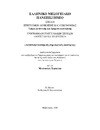| heal.creatorName | Μπαλασάκη, Χαρίκλεια | el |
| heal.creatorName | Balasaki, Charikleia | en |
| heal.publicationDate | 2020-05-12 | |
| heal.identifier.primary | http://hdl.handle.net/20.500.12688/9437 | |
| heal.abstract | Σκοπός: Μελετήσαμε τις δυνατότητες επενδυτικών ευκαιριών στην δυναμικά αναπτυσσόμενη βιομηχανία πολιτισμικών και δημιουργικών αγαθών και υπηρεσιών. Μεθοδολογία: Η προσέγγισή μας είναι αναλυτική και συνθετική νέων εννοιών τόσο στα Ηνωμένα Έθνη (UNCTAD) όσο και στην Ευρωπαϊκή Επιτροπή (European System of Accounts, 2010) μέσω των οποίων εντοπίζουμε νέες ευκαιρίες μετατροπής των πολιτισμικών ή δημιουργικών περιουσιακών στοιχείων σε «οικονομικά» αναδεικνύοντας τρόπους διεθνούς εμπορευσιμότητας τους, οι οποίοι ισοδυναμούν με αύξηση της προστιθέμενης οικονομικής αξίας της παραγωγής μας. Ευρήματα: Διαπιστώσαμε αφενός τη δυναμική της μεγέθυνσης των ιστορικών χρονοσειρών σε πολιτισμικές και δημιουργικές υπηρεσίες που προσφέρονται όλο και περισσότερο στη χώρα μας, κι αφετέρου τα μεγάλα περιθώρια ανάπτυξης του κλάδου (Ι ή AYO_AYQ με κωδ. ESA-‘10). Ήδη στην Ελλάδα απασχόλησε το 6,6% του συνολικού εργατικού δυναμικού, κατά μέσο όρο την περίοδο 1995-2018 (ΕΛΣΤΑΤ), καταλαμβάνοντας την 7η θέση στους 10 παραγωγικούς κλάδους, πάνω από εκείνους των «χρηματοπιστωτικών/ασφαλιστικών υπηρεσιών», «ενημέρωση-επικοινωνία» και «διαχείριση ακίνητης περιουσίας». Οι προοπτικές του είναι σημαντικές αφού μένει ουσιαστικά ανεκμετάλλευτος φτάνοντας το 60% της μέσης συνολικά προστιθέμενης αξίας όλων των κλάδων την δειγματική περίοδο (1995-’18, συνολικός μέσος 40,4 εκατ.€). Περιορισμοί: Η μελέτη μας περιορίστηκε στις προοπτικές του Ελληνικού κλάδου Ι που μας ενδιαφέρει. Εντούτοις, στον κλάδο αυτό δεν περιλαμβάνονται μόνο πολιτισμικές-δημιουργικές υπηρεσίες και προϊόντα. Επιπτώσεις Πολιτικής ή Στρατηγικής: Τα ευρήματά μας μπορούν να αξιοποιηθούν συμβάλλοντας στην οικονομική μεγέθυνση της χώρας μας, τόσο σε επίπεδο οικονομικής πολιτικής πχ. υποστηρίζοντας προτεραιότητες συνεργιών πολιτισμού-τουρισμού ή πολιτισμικών-δημιουργικών υπηρεσιών με έργα συμπράξεων δημοσίου και ιδιωτικού τομέα (ΣΔΙΤ), όσο και σε επίπεδο στρατηγικών επιλογών νεοφυών ή ορθότερα καινοτόμων επιχειρήσεων που θα εκμεταλλευτούν το σπουδαιότερο συγκριτικό πλεονέκτημα της χώρας μας που είναι καταφανώς ο Πολιτισμός της. | el |
| heal.abstract | Purpose: The purpose of the current assignment is to examine the investment opportunities in a developing industry of cultural and creative goods and services.
Methodology: The approach followed combines both analytic and synthetic procedures of new meanings within United Nations (UNCTAD) and the European System of Accounts. Through these new ideas we managed to identify original opportunities in an attempt to transform cultural or productive tangible assets into economic ones, aiming at featuring their international marketability. These features will lead to new value added of the national production.
Findings: The findings include a dynamic upward trend for cultural and productive services time series which are increasingly offered in our country. In addition, there are great opportunities of development in Greek industry. The relevant Greek sector “I” has occupied 6.6% of the total workforce during the period 1995-2018, being at the 7th place among 10 productive sectors. It was actually above those concerning financial/funds, information/ communication as well as real estates’ services. The perspectives of the sector are great since it can reach the 60% of the total value added of national production.
Limitations: The current study has focused on the potentials of the local sector “I” which has been our interest for economic development purposes. Yet, the sector includes services and products other than cultural and creative ones.
Policy implications: Our findings can be useful for policy makers interested in economic growth of Greece, by prioritizing cultural-tourism or cultural-creative services together with public–private partnerships or PPPs, as well as for managers who aim on strategic choices of new and innovative businesses exploiting the greatest comparative advantage of the country, that is both its history and dynamic perspectives of culture. | en |
| heal.language | Ελληνικά | el |
| heal.language | Greek | en |
| heal.academicPublisher | ΕΛ.ΜΕ.ΠΑ., Σχολή Επιστημών Διοίκησης και Οικονομίας (ΣΕΔΟ), ΔΠΜΣ Λογιστική και Ελεγκτική | el |
| heal.academicPublisher | H.M.U., School of Management and Economic Sciences (SMES) MSc in Accounting and Auditing | en |
| heal.title | Λογιστική πολιτισμικής-δημιουργικής οικονομίας. | el |
| heal.title | The accounting of cultural-creative economy. | en |
| heal.type | Μεταπτυχιακή Διατριβή | el |
| heal.type | Master thesis | en |
| heal.keyword | δημιουργική οικονομία, λογιστική, πολιτισμός | el |
| heal.keyword | creative economy, accounting, culture | en |
| heal.access | free | el |
| heal.advisorName | Σταματόπουλος, Θεόδωρος | el |
| heal.advisorName | Stamatopoulos, Theodoros | en |
| heal.advisorID.email | stamth@hmu.gr | |
| heal.academicPublisherID | ΕΛ.ΜΕ.ΠΑ. Ελληνικό Μεσογειακό Πανεπιστήμιο | el |
| heal.academicPublisherID | Η.Μ.U Hellenic Mediterranean University | en |
| heal.fullTextAvailability | true | el |
| tcd.distinguished | false | el |
| tcd.survey | false | el |


